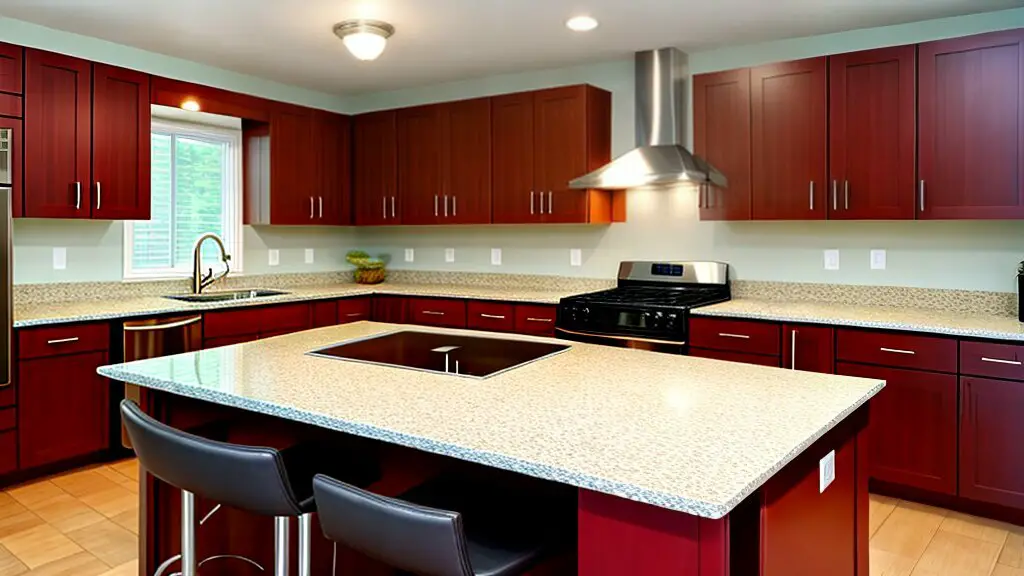If you’re looking to upgrade your kitchen, natural stone countertops are a great choice. Not only are they durable and long-lasting, but they also add a touch of elegance and sophistication to any space. Natural stone countertops are available in a variety of colors and patterns, making it easy to find the perfect style for your kitchen.
One of the most significant advantages of natural stone countertops is their durability. Unlike other materials that can wear and tear over time, natural stone countertops can withstand heavy use and last for decades. They’re also resistant to heat, scratches, and stains, making them an excellent choice for busy kitchens.
If you’re concerned about the environmental impact of your kitchen renovation, natural stone countertops are an eco-friendly option. They’re made from natural materials and require minimal processing, reducing the amount of energy and resources needed to produce them.
Investing in natural stone countertops is a smart choice for any homeowner. Not only will they add value to your home, but they’ll also provide you with a beautiful and durable surface for years to come.
Key Takeaways:
- Natural stone countertops are durable, long-lasting, and add elegance to any kitchen.
- Natural stone countertops are available in a variety of colors and patterns.
- Natural stone countertops are eco-friendly and require minimal processing.
What is Natural Stone?
Before delving into the benefits of natural stone countertops, it’s important to understand what natural stone actually is. Natural stone is a product of nature that is quarried from the earth’s crust. It is composed of various minerals and is formed over thousands of years from intense heat and pressure.
There are several types of natural stone used for countertops, including granite, marble, quartzite, soapstone, and slate. Each material has its own unique characteristics and qualities, making it suitable for different kitchen styles and needs.
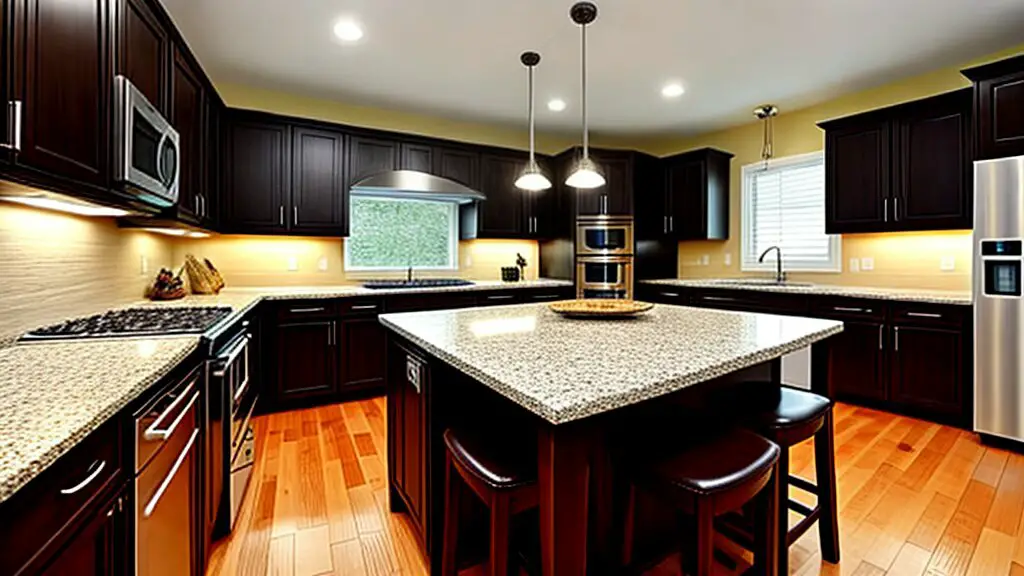
“Natural stone countertops offer a timeless and elegant look that can enhance the beauty of any kitchen.”
One of the most attractive features of natural stone is its durability. It is heat resistant, scratch resistant, and can withstand heavy use without showing signs of wear and tear. Additionally, natural stone is easy to clean and maintain, making it a popular choice for busy families and homeowners.
In the next section, we will explore the differences between natural stone and engineered stone, another popular countertop material.
What is Engineered Stone?
If you’re considering upgrading your kitchen countertops, you’ve likely come across both natural and engineered stone options. While natural stone is quarried from the earth, engineered stone is a man-made product that consists of crushed natural stone mixed with a binding agent.
Also known as quartz countertops, engineered stone countertops are designed to look like natural stone but offer a uniform appearance and greater resistance to stains and scratches. The manufacturing process involves combining 90% ground natural quartz with resins, polymers, and pigments to create a highly durable and customizable material.
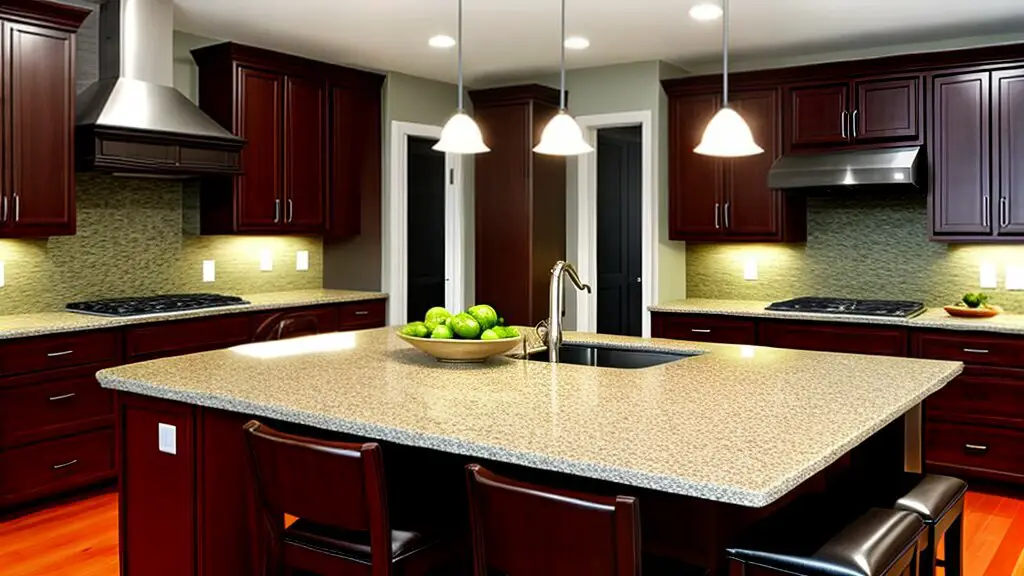
One of the main advantages of engineered stone is its versatility. Because it’s a manufactured product, it comes in a wide range of colors and patterns that can be customized to suit your specific kitchen design. It’s also non-porous, meaning it won’t absorb liquids or oils like natural stone, making it easier to clean and maintain.
However, one potential drawback of engineered stone is that it’s not heat-resistant, so you’ll need to be careful when placing hot pots or pans on the surface to avoid damage. Additionally, while it’s more scratch-resistant than natural stone, it’s not entirely scratch-proof.
The Key Differences Between Engineered and Natural Stone
When it comes to choosing countertops for your kitchen, you have two main options: natural stone and engineered stone. While both types of stone offer their own set of advantages and drawbacks, there are several key differences between them that are worth considering before making a decision.
| Natural Stone | Engineered Stone | |
|---|---|---|
| Appearance | Natural variations in color and pattern create a unique, one-of-a-kind look. | Uniform colors and patterns can create a more consistent, contemporary look. |
| Durability | Some natural stones, such as granite, are extremely durable and resistant to scratches and heat. | Engineered stone is generally more durable and resistant to spills and scratches. |
| Maintenance | Natural stone requires regular sealing to prevent staining and etching. | Engineered stone is virtually maintenance-free and does not require sealing. |
| Cost | Natural stone can be more expensive, especially if you choose a rare or exotic type. | Engineered stone is generally less expensive than natural stone. |
Ultimately, the choice between natural and engineered stone comes down to personal preference and the specific needs of your kitchen. If you prefer a unique, natural look and don’t mind a little maintenance, natural stone may be the way to go. If you prioritize durability and low maintenance, the engineered stone may be the better choice. Consider your budget, lifestyle, and overall kitchen design when making your decision.
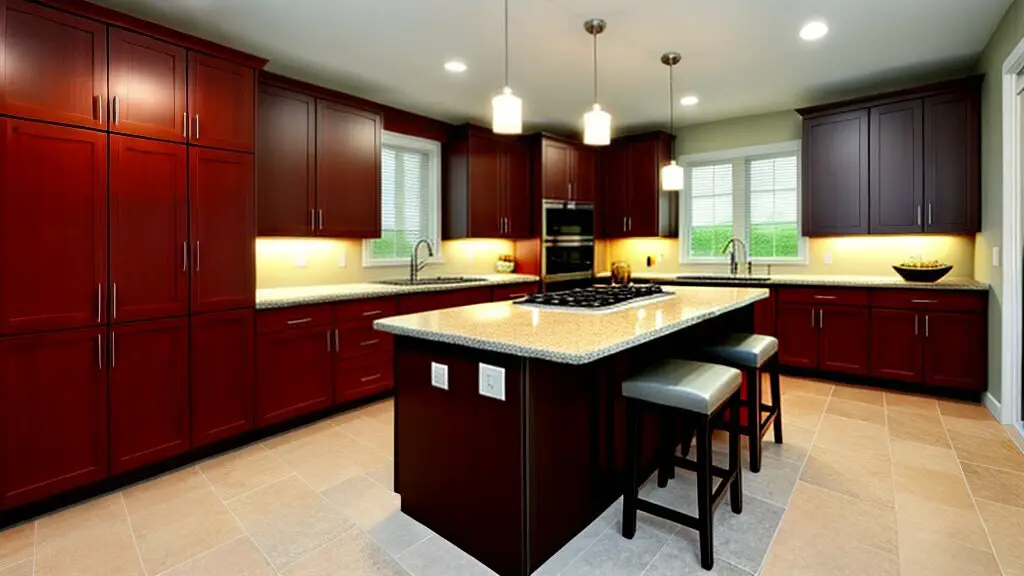
The Pros and Cons of Natural vs. Man-made Countertop Materials
Choosing the right material for your kitchen countertops is a big decision. There are numerous factors to consider, from durability and maintenance to aesthetics and budget. When it comes to countertop materials, you have two main options: natural stone and man-made materials. Each has its own advantages and disadvantages, which we will explore below.
Pros of Natural Stone Countertops:
- Beauty: Natural stone is prized for its unique beauty and character. Each piece of stone is one-of-a-kind, with its own color variations and patterns.
- Durability: Natural stone is incredibly hard and durable, making it resistant to scratches and damage. With proper care, it can last a lifetime.
- Heat Resistance: Natural stone is heat-resistant, so you can place hot pots and pans directly on your countertops without worry.
- Value: While natural stone countertops can be expensive upfront, they can add value to your home and last for decades, making them a worthwhile investment.
- Environmental Friendliness: Natural stone is a renewable resource that can be recycled and reused, making it an eco-friendly choice.
Cons of Natural Stone Countertops:
- Maintenance: Natural stone requires regular maintenance, including sealing and cleaning, to keep it looking great and prevent staining.
- Cost: Natural stone countertops can be expensive, with certain types costing significantly more than others.
- Weight: Natural stone is heavy and may require additional support to prevent damage or cracking.
Pros of Man-made Countertops:
- Affordability: Man-made materials can be more affordable than natural stone, making them a great option for those on a budget.
- Low Maintenance: Man-made materials are often non-porous and require very little maintenance, making them great for busy families.
- Consistency: Man-made materials are manufactured to be consistent in color and pattern, providing a uniform look throughout your kitchen.
- Lightweight: Man-made materials are lightweight, making them easy to install and less likely to require additional support.
Cons of Man-made Countertops:
- Durability: Man-made materials may not be as durable as natural stone, and they can scratch or chip more easily.
- Heat Resistance: Some man-made materials may not be as heat-resistant as natural stone, so you may need to use trivets or hot pads to protect your countertops.
- Environmental Impact: Man-made materials often have a larger carbon footprint than natural stone, as they are made with synthetic materials and chemicals.
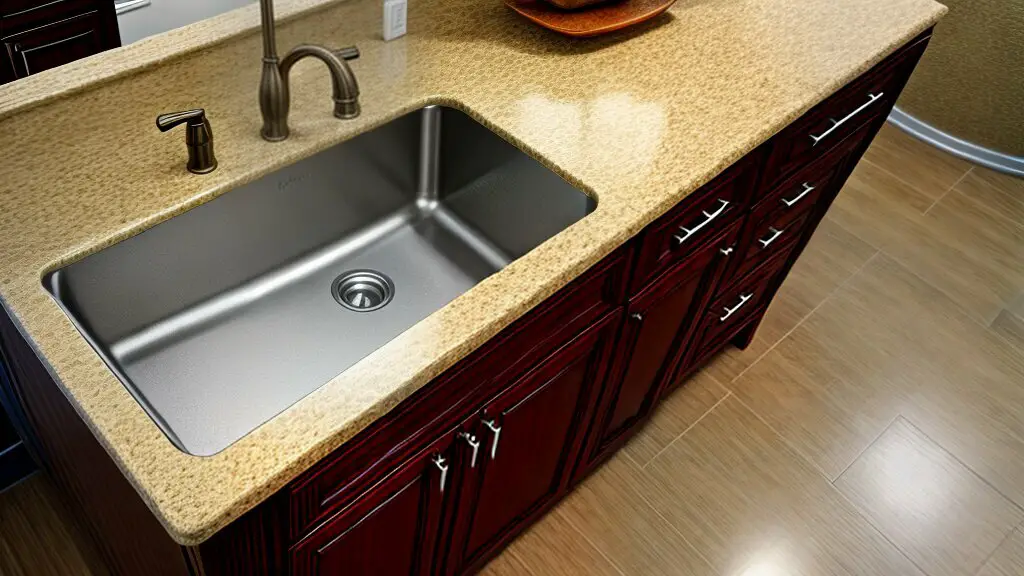
Ultimately, the choice between natural stone and man-made materials comes down to personal preference and individual needs. Consider factors such as durability, maintenance, aesthetics, and budget when selecting your countertop material. No matter which option you choose, make sure to select a reputable installer and follow proper care and maintenance guidelines to ensure your countertops stay looking great for years to come.
Popular Types of Natural Stone Countertops
When it comes to natural stone countertops, there are a variety of options to choose from. Each type of stone has its own unique characteristics and aesthetic qualities, making it important to carefully consider which one will best suit your kitchen needs. Below are six of the most popular types of natural stone countertops:
| Stone Type | Characteristics | Color Options |
|---|---|---|
| Granite | Durable, heat-resistant, and scratch-resistant. Each slab is unique with varying patterns and colors. | Black, gray, white, pink, green, and more. |
| Marble | Soft and porous material that requires regular maintenance. Known for its elegant and luxurious appearance. | White, gray, beige, black, green, and more. |
| Quartzite | Durable and heat-resistant. Resembles marble, but with a harder surface and less maintenance required. | White, gray, beige, green, and more. |
| Soapstone | Durable and heat-resistant. Requires regular maintenance to maintain its dark color and oily feel. | Dark gray, black, and green. |
| Slate | Durable and heat-resistant. Known for its unique texture and natural clefting. | Gray, green, black, and red. |
| Limestone | Soft and porous material that requires regular maintenance. Known for its muted colors and unique fossils. | Beige, gray, and black. |
Choosing the right type of natural stone countertop can have a significant impact on the overall look and feel of your kitchen. Take the time to research each option and consider factors such as durability, maintenance requirements, and aesthetic preferences before making your final decision.
When to Choose Natural vs. Manufactured Countertops
Deciding between natural stone and manufactured countertops can be a difficult task, but it ultimately comes down to personal preferences and the specific needs of your kitchen. While both options have their advantages and disadvantages, natural stone offers a timeless and elegant look that may be more suitable for certain design styles.
If you are looking for a countertop material that is durable, heat-resistant, and easy to maintain, natural stone is a great choice. It is also a sustainable and eco-friendly option, as it is made from natural materials and does not require as much energy to produce as manufactured materials.
However, if you are working with a tight budget, manufactured countertops may be more affordable and offer more color and design options. They are also generally more resistant to stains and scratches, making them a practical choice for busy households.
Ultimately, the decision between natural and manufactured countertops comes down to a combination of personal preference, budget, and practicality. If you value durability, sustainability, and classic elegance, natural stone countertops are the way to go. If you are looking for a more affordable and practical option with a wider range of designs and colors, manufactured countertops may be the better choice.
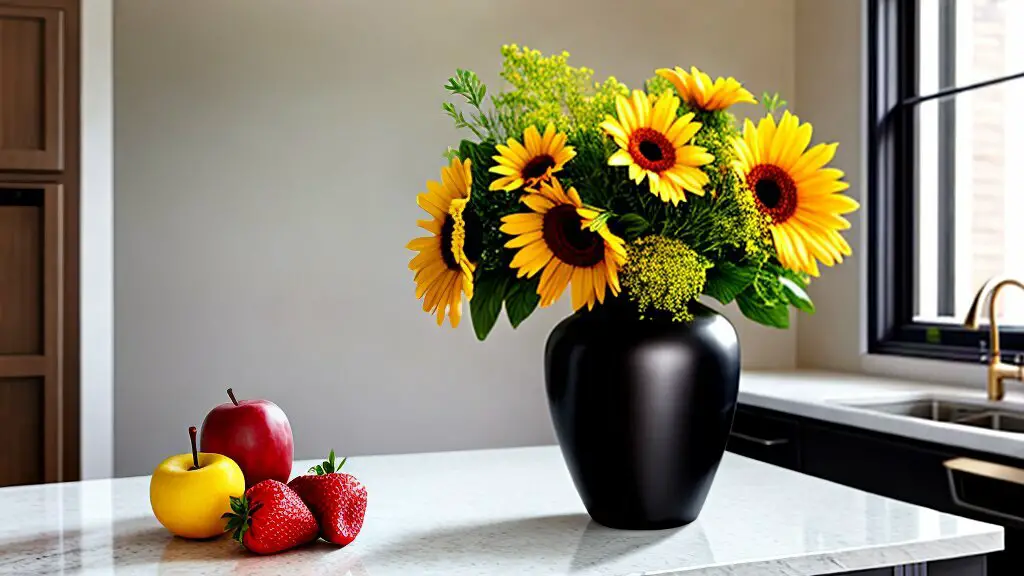
Whichever option you choose, it is important to do your research and choose a reputable supplier who can provide you with high-quality materials and installation services. With the right choice of countertop, you can elevate the overall look and feel of your kitchen while also adding value to your home.
6 Popular Natural Stone Countertop Materials
If you’ve decided that natural stone is the way to go for your kitchen countertops, you may be wondering which type of stone is right for you. Here are six of the most popular natural stone materials for countertops:
| Material | Description | Pros | Cons |
|---|---|---|---|
| Granite | Hard, durable material with a natural speckled appearance | Durable, heat-resistant, scratch-resistant | Requires sealing, can be expensive |
| Marble | A softer, more elegant stone with a natural veined appearance | Beautiful, heat-resistant | May stain and scratch easily, requires regular sealing and maintenance |
| Quartzite | Hard, durable material with a naturally marbled appearance | Durable, heat-resistant, scratch-resistant, and less porous than granite or marble | Can be expensive, limited color options |
| Soapstone | A softer, matte-finished material with a natural smooth appearance | Non-porous, heat-resistant, scratch-resistant, easy to maintain | May darken over time, susceptible to scratches and chips, limited color options |
| Slate | Hard, natural material with a smooth, matte finish and subtle color variations | Durable, heat-resistant, scratch-resistant, non-porous | May chip or scratch, limited color options |
| Travertine | A porous, natural material with a smooth, honed finish and natural color variations | Distinctive appearance, heat-resistant | Not as durable or scratch-resistant as other natural stone options, requires regular sealing and maintenance |
Each of these natural stone materials has its own unique characteristics and benefits. Consider your personal preferences, your kitchen design, and your budget when choosing the right material for your countertops.
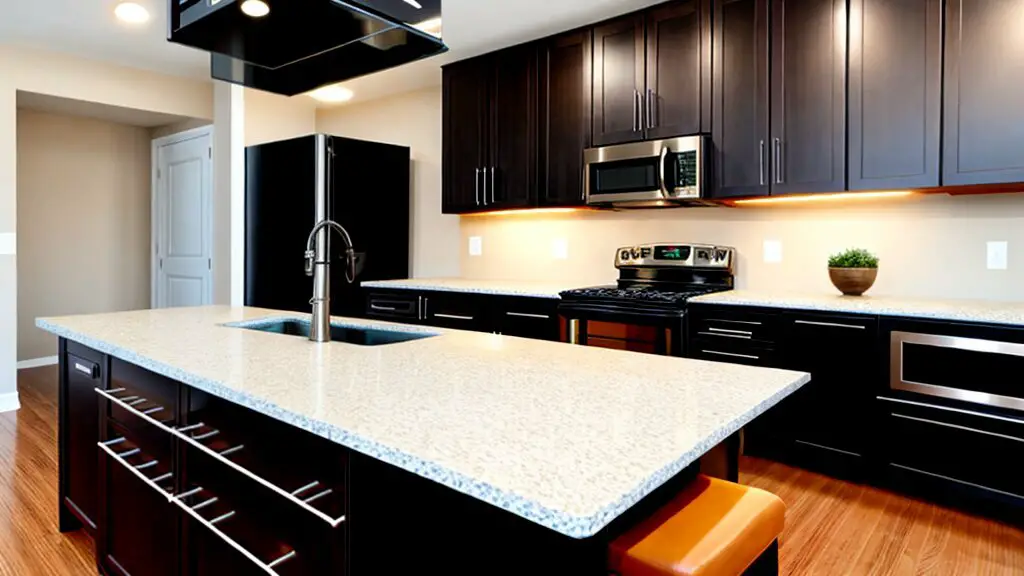
Which Natural Stone is Best for Countertops?
Natural stone countertops come in a variety of options, each with its own unique qualities and characteristics. When choosing the best natural stone for your countertops, it’s important to consider the specific needs of your kitchen. Here are some factors to keep in mind:
- Durability: You want a natural stone that can withstand the wear and tear of daily use without showing signs of damage.
- Maintenance: Some natural stones require more upkeep than others. Consider how much time and effort you’re willing to invest in maintaining your countertops.
- Aesthetic preferences: Do you prefer a bold and dramatic look or a more subdued and neutral tone? Do you want a natural stone with distinct veining or a more uniform appearance?
With these factors in mind, some popular natural stones for countertops include:
| Stone Type | Characteristics |
|---|---|
| Granite | Durable, heat-resistant, and available in a wide range of colors and patterns. Some types of granite may require sealing to prevent staining. |
| Marble | Elegant and timeless, but softer and more prone to scratching and staining than other natural stones. Marble may require more frequent sealing. |
| Quartzite | A hard and durable natural stone with a unique sparkle. Quartzite is resistant to scratching, staining, and heat, making it a low-maintenance option for countertops. |
| Soapstone | A smooth and non-porous natural stone that’s resistant to stains and bacteria. Soapstone is heat-resistant but can scratch more easily than other natural stones. |
| Slate | A darker natural stone that’s resistant to stains and scratches. Slate is non-porous, making it a hygienic option for kitchen countertops. |
Ultimately, the best natural stone for your countertops will depend on your personal preferences and the specific needs of your kitchen. Consult with a professional stone supplier to find the perfect natural stone for your home’s design and functionality.
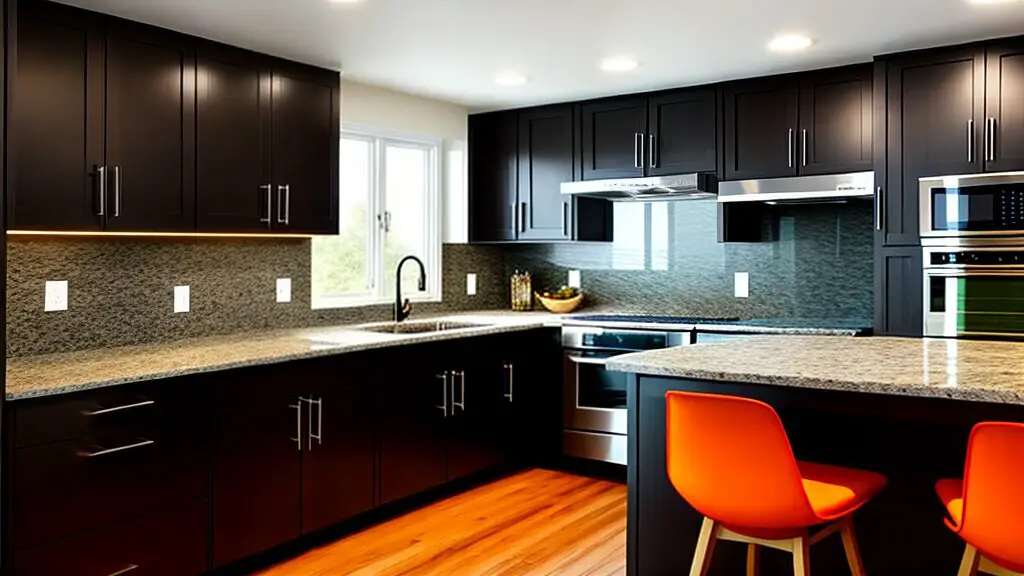
Is Natural Stone Good for Countertops?
If you’re considering upgrading your kitchen countertops, you may be wondering if natural stone is a good option. There are some common concerns and misconceptions about this material, but overall, natural stone is an excellent choice for countertops.
One concern is that natural stone can stain easily. While it’s true that some types of stone are more porous than others, you can prevent staining by applying a sealant to the surface. Additionally, with proper care and maintenance, natural stone can withstand regular use and even minor spills.
Another concern is that natural stone can scratch easily. While it’s true that some types of stone are softer than others and therefore more susceptible to scratches, you can prevent this by using cutting boards and avoiding placing sharp objects directly on the surface of your countertops.
Finally, some people worry that natural stone is not heat-resistant. While it’s true that some types of stone can crack under extreme heat, such as placing a hot pot directly on the surface, most natural stone materials are heat-resistant and can withstand normal kitchen use.
Overall, natural stone is a durable and long-lasting choice for kitchen countertops. With proper care and maintenance, it can withstand daily use for many years, making it a worthwhile investment in your home.
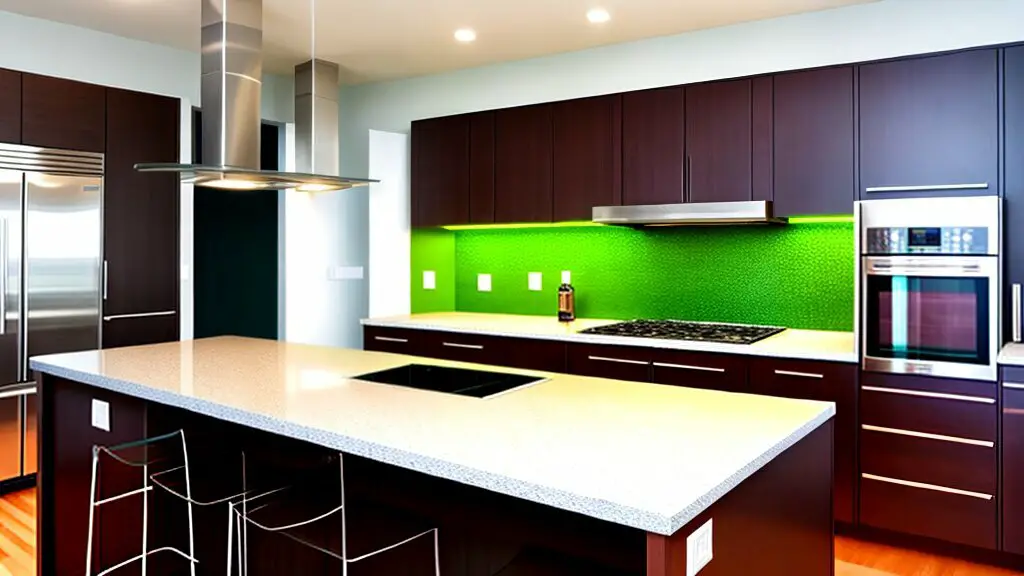
Conclusion
Congratulations! You are now well-informed about upgrading your kitchen with natural stone countertops. You learned that natural stone is a durable and elegant material that adds value to your home. You now know there are various types of natural stone and engineered stone countertops available.
You also compared and contrasted the differences between engineered and natural stone countertops. You learned about the advantages and disadvantages of choosing natural stone over man-made materials. You discovered six popular types of natural stone used for countertops, and which natural stone is best for countertops based on your needs.
You also discovered that natural stone is a good choice for countertops, despite common misconceptions about staining, scratching, and heat resistance. Natural stone is a wise investment that will last for generations to come.
Now, it’s time to take the leap and upgrade your kitchen with natural stone countertops. Whether you choose granite, marble, quartzite, soapstone, slate, or another natural stone, you can’t go wrong with this timeless and durable material. Enjoy your new kitchen and the added value it brings to your home!
Thanks For the Great Attention!
Good Bye & Take Care
Happy Learning
Also, Read,
1000sqft House Plinth Beam Cost
POP Vs Gypsum Vs PVC Vs Grid False Ceiling – An Ultimate Comparision
Wall Mounted vs Floor Mounted Toilets
FAQ
Q: What is Natural Stone?
A: Natural stone is a type of rock that is formed naturally over millions of years. It is quarried from the earth and used for various applications, including countertops. Natural stone countertops are made from materials such as granite, marble, quartzite, soapstone, and slate.
Q: What is Engineered Stone?
A: Engineered stone, also known as quartz, is a man-made material composed of crushed quartz, resin, and pigments. It is designed to mimic the look of natural stone but offers enhanced durability and consistency in color and pattern. Engineered stone countertops are popular for their low maintenance and wide range of color options.
Q: What are the key differences between engineered and natural stone?
A: Engineered stone countertops are manufactured using a mixture of crushed quartz, resin, and pigments, while natural stone countertops are made from quarried rocks such as granite, marble, quartzite, soapstone, and slate. In terms of appearance, natural stone offers unique patterns and variations, while engineered stone has a more consistent look. Natural stone is generally more durable and heat-resistant, but engineered stone is less prone to staining. Additionally, natural stone requires periodic sealing, while engineered stone does not.
Q: What are the pros and cons of natural vs. man-made countertop materials?
A: Natural stone countertops offer a timeless and unique beauty, with each slab showcasing its own patterns and colors. They are also generally more heat-resistant and durable. However, natural stone can be more expensive and may require regular sealing to prevent staining. On the other hand, man-made countertop materials like engineered stone offer a wide range of color options, consistent patterns, and resistance to staining. They are also typically easier to maintain. However, they may lack the natural beauty and uniqueness of natural stone.
Q: Which natural stone materials are popular for countertops?
A: Some popular types of natural stone used for countertops include granite, marble, quartzite, soapstone, and slate. Granite is known for its durability and natural beauty, while marble offers a luxurious and elegant look. Quartzite combines the durability of granite with the veining of marble. Soapstone is heat-resistant and has a smooth, velvety texture. Slate is a durable and low-maintenance option with a unique texture and color range.
Q: When should I choose natural stone countertops over manufactured options?
A: Choosing between natural stone and manufactured countertops depends on personal preferences, budget, and overall kitchen design. If you value the natural beauty and uniqueness of stone and are willing to invest in regular maintenance, natural stone countertops may be the best choice. However, if you prefer a wide range of color options, consistent patterns, and low maintenance, manufactured options like engineered stone may be more suitable.
Q: What are some popular natural stone countertop materials?
A: Six popular natural stone countertop materials include granite, marble, quartzite, soapstone, slate, and quartz. Granite offers durability and natural beauty, while marble provides a luxurious and elegant look. Quartzite combines the durability of granite with the veining of marble. Soapstone is heat-resistant and has a smooth, velvety texture. Slate is durable and low-maintenance with a unique texture and color range. Quartz, although not a natural stone, is often categorized as one due to its composition.
Q: Which natural stone is best for countertops?
A: The best natural stone for countertops depends on factors such as durability, maintenance requirements, and aesthetic preferences. Granite is known for its durability and resistance to heat and scratches, making it a popular choice for kitchen countertops. Marble offers a luxurious and elegant look but requires more maintenance. Quartzite is a durable and heat-resistant option that mimics the appearance of marble. Soapstone is ideal for those seeking a soft and unique look. Ultimately, the best natural stone will depend on your specific kitchen needs and personal preferences.
Q: Is natural stone good for countertops?
A: Yes, natural stone is generally a good choice for countertops. While concerns such as staining, scratching, and heat resistance may arise, proper care and maintenance can mitigate these issues. Natural stone countertops offer durability, timeless beauty, and a variety of unique patterns and colors. With regular sealing and proper care, natural stone countertops can last for decades and become a focal point of your kitchen.

